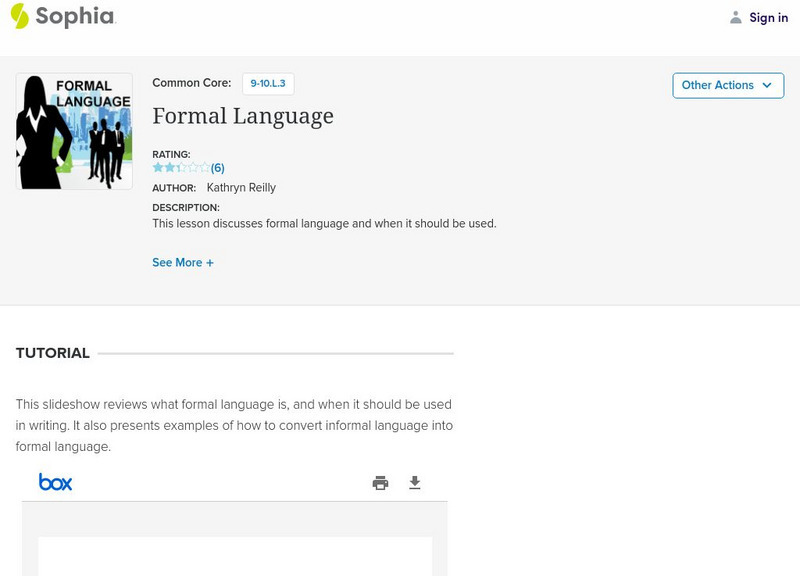Hi, what do you want to do?
ReadWriteThink
Style-Shifting: Examining and Using Formal and Informal Language Styles
Your high schoolers are probably versed in two languages: formal language, and informal conversation. Help them identify the correct language style for their audience and context with a thorough lesson and examples of different speech...
EngageNY
Peer Critique and Revising: Formal English
Dear Sir or Madam: What's the difference between formal and informal language? Scholars focus on using formal English and transitions in their position papers. After revising their rough drafts, they engage in the peer editing process...
EngageNY
End of Unit Assessment: Presentation of Position
What is the difference between formal and informal language? Pupils rewrite their position speeches to adapt them for an audience of adults. Next, they present their speeches in small groups, attempting to answer the question, "Which...
College Board
2018 AP® Human Geography Free-Response Questions
What role do women play in agrarian economies? How has gentrification affected neighborhoods in positive and negative ways? To what extent has language evolved over time? Learners consider these questions using authentic test questions...
Macmillan Education
Slang
A four-part worksheet challenges scholars' knowledge of American, Australian, and British slang. Learners use context clues to decide which country a slang word is from, complete sentences, decipher a conversation, and answer...
Portland Public Schools
Teaching Tone to Teenagers
Tone is a tough topic to teach to teenagers. But never, fear, help is here in the form of a unit plan that takes advantage of their interest in music to set the stage for a series of activities that lead them to understand how setting,...
Curated OER
Thanksgiving
Introduce the basics of Thanksgiving with a language arts instructional activity. As pupils practice observation skills, vocabulary, and reading comprehension, they design paper turkeys by outlining their hands and feet and by...
One Stop English
A Lesson on Register
The classroom might not be the best place for informal language, but it's a great place to teach middle and high schoolers how to identify the correct language register for their audience. A short lesson on formal and informal language...
EngageNY
Summarizing Complex Ideas: Comparing the Original UDHR and the "Plain Language" Version
The eighth lesson plan in this series continues the focus on vocabulary and increasing young readers' awareness of academic language. Pairs of learners participate in a short vocabulary review activity called Interactive Words in which...
University of North Carolina
Should I Use “I”?
Despite the formal nature of academic writing, personal pronouns frequently appear in high school and college papers. While your first instinct may be to cross them out, sometimes it's okay to use them, an idea covered in a handout that...
Curated OER
Formal and Informal Language Resources
Yo! Check it out. Here's a lesson on formal and informal language. And the packet includes a game. What fun!
Curated OER
From Formal To Slang
Tenth graders define the term slang, explaining its various social, historical, and racial contexts, so as to articulate when it can be appropriately used as a means of effective communication. They use their own personal slang lexicon,...
Curated OER
Diction: Formal and Informal Language
Coke or Pepsi? Is it the taste or the advertising that determines preference? As part of a study of diction, class members examine two passages, one formal and one informal, about Coca-Cola and Pepsi. In addition, they consider word...
Curated OER
Formal and Informal Language
Words carry connotative baggage and some suitcases are bigger than others. Learners consult the Chambers School Dictionary to identify the formal, informal or slang words used in a series of exercises.
Curated OER
Slang
Students examine the term 'slang' after reading two stories, "'Cool' is your favorite word!" and "Bling bling makes it into dictionary". Students work on composing their own rhyming words and phrases after studying slang.
TES Global
Tes: Romeo and Juliet: Prologue Introduction Resource
[Free Registration/Login Required] This downloadable activity is designed for the Prologue to William Shakespeare's Romeo and Juliet. Learners will match quotes from the Prologue to sentences that are less formal. Students will also...
CPALMS
Cpalms: The Lesson Formerly Known as "Wassssuuup"
[Free Registration/Login Required] In this instructional activity, students are actively engaged in learning how formal and informal language are used in written and oral communications. Downloadable handouts are provided.
Online Writing Lab at Purdue University
Purdue University Owl: Academic Writing: Levels of Formality
Basic information explaining how the context, i.e., the audience and your purpose, determines whether you should use formal, semi-formal, or informal language. The links on the sidebar provide much more information about formal academic...
Other
Pitner's Potpourri: Formal and Informal Language
A Common Core teacher resource provides an approach to educating students on the differences between formal and informal language.
Sophia Learning
Sophia: Formal Language
This slideshow lesson focuses on formal language. It reviews the basics of formal language and the need to know your audience. It explains how to change various types of informal language into formal language and provides examples....
Other
Match the Memory: Formal vs Informal Language
Match the Memory Interactive game where players match a word to either formal or informal language.
Grammarly
Grammarly Handbook: Cliches
This page focuse on cliches and explains why they should not be used in formal writing; it provides examples of other words to get the point across more clearly.
Online Writing Lab at Purdue University
Purdue University Owl: Using Appropriate Language
Knowing the right language for your particular audience is a necessary skill for all writers. No one wants to offend their audience or appear as though they don't know their content. Learn these rules of thumb to become more familiar...
ReadWriteThink
Read Write Think: Lesson Plan: Audience, Purpose, Language in Electronic Messages
Lesson plan considers changes in writing style since the inception of e-mail and text messaging.




























